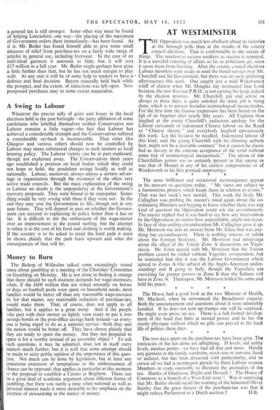A Swing to Labour
Whatever the precise tally of gains and losses in the local elections held in the past fortnight—the party affiliation of some candidates who labelled themselves neither Conservative nor Labour remains a little vague—the fact that Labour has achieved a considerable triumph and the Conservatives suffered a considerable set-back is incontestable. That cities like Glasgow and various others should now be controlled by Labour may mean substantial changes in such matters as local housing policy. The Labour victory can be in part explained, though not explained away. The Conservatives three years ago established a position on local bodies which they could not hope to hold; the pendulum swings locally as well as nationally. Labour, moreover, always enjoys a certain advan- tage in organisation through the existence of the often very active trade councils. But the main explanation of the swing to Labour no doubt is the unpopularity of the Government's recovery proposals. They were bound to be unpopular. Some- thing would be very wrong with them if they were not. In the end they may cost the Government its life, though not in any near future. That will depend in part on whether the Govern- ment can succeed in explaining its policy better than it has so far. It is difficult to stir the enthusiasm of the wage-earner over an improvement in the pound sterling, but the attempt to relate it to the cost of his food and clothing is worth making. If the country is to be asked to tread the hard path it must be shown plainly that the path leads upward and what the consequences of that will be.


































 Previous page
Previous page